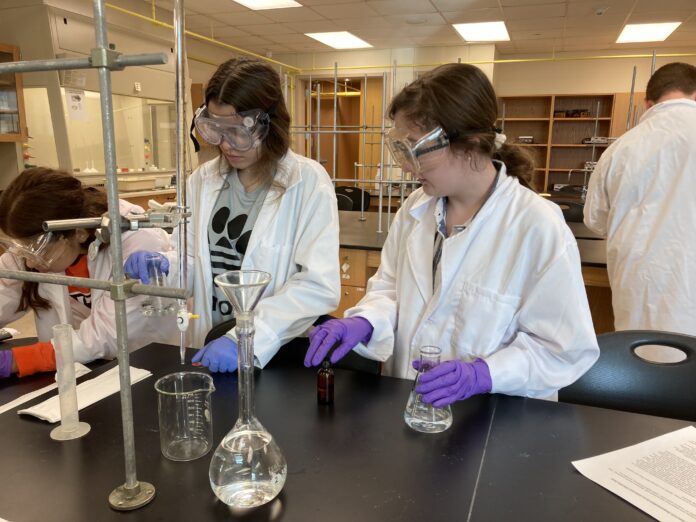High school students trying to figure out what scientific or medical field they might be interested in are getting some real-life experience at University of Texas Permian Basin’s Biomedical Experience Camp going on this week and next.
In cooperation with the College of Arts & Sciences at UTPB, the Biomedical Research Center the camp was established for regional high school students and held in the Science and Technology Building at the university.
The center’s focus is on state-of-the-art research, primarily in the areas of heart disease, neurodegenerative diseases, gout and biomedical analytics, so participants are trying their hand at leading-edge research in those areas, said Scott McKay, dean of the College of Arts & Sciences and a chemistry professor.
There are 12 campers and McKay said they started small to see how it would work out.
The BRC is committed to assist in the development of the next generation of Biomedical Professionals for the Permian Basin Region, McKay said in an email.
Participating professors include Xuemin Xu, professor and director of the Biomedical Research Center, Mei-Zhen Cui, professor and co-director of the BRC, Choa Dong, assistant professor in the chemistry program, and Milka Montes, associate professor and chemistry department chair.
Swetha Kesavan, 17, and Joaquin Armendariz, 16, are both going into their senior year at Permian High School.
“Personally, I wanted to see if I would be interested in pursuing research whenever I go off to university,” Armendariz said.
“So far, I think I’m enjoying being able to actually work in a lab because last year with COVID we weren’t able to do the experiments we were set out to do,” Armendariz added.
Kesavan agreed.
“I actually like doing this research experience because I’ve been wanting to major in biochemistry and these research experiments focus on that aspect, so it kind of confirmed what I want to major in,” she added.
Armendariz said they also get to learn about experiment preparation.
Xuemin Xu said faculty members involved in the camp present a short lecture based on the science of what they are working on. For example, Xu said he talks about his work on Alzheimer’s disease and ALS.
Salma Zobaa, 15, from Odessa Collegiate Academy, Analyssa Castillo, 16, at UTPB STEM Academy, Nathan Reddy, 16, from Odessa High School, and Victoria Ojo, 14, at OCA, were working on experiments for Xu’s work.
Zobaa said her dad got an email about it.
“I really like it because it gives a hands-on experience in the lab and not many people get that experience, so I decided to come join …,” she said.
Ojo said a former teacher recommended the program to her. She wants to major in biochemistry, so she thought this program would help.
Castillo agreed that this is a great chance for her and her peers because it can help you decide on the career you want.
“So this is a good aspect on whether I really want to work in the lab, or if I just want to do the research or actually become a doctor,” Castillo said.
Reddy said the camp is really interesting. Getting to use a university lab is eye opening.
“It’s different compared to our school labs and everything,” Reddy said.
The students said the equipment is higher-level than what they’re used to, which they like.
In her lab, Montes said they are practicing basic chemistry laboratory techniques that are used for preparing solutions to be used in biomedical research. Montes said they are learning pretty much what undergraduate students would be.
On July 15, they were preparing solutions to prepare hydrogels. A hydrogel is a three-dimensional network of hydrophilic polymers that can swell in water and hold a large amount of water while maintaining the structure due to chemical or physical cross-linking of individual polymer chains, according to “An Introduction to Hydrogels and Some Recent Applications.”
“Their main project is going to be making hydrogels that are going to have certain chemical compounds used for medical purposes like wound care,” Montes said.
“They’re going to be using some antibiotic compounds and antibacterial compounds that they’re going to put on their hydrogels, so by the end of the two-week summer camp they’re going to … prepare the hydrogels and characterize them,” Montes said.
She said they wouldn’t have time to run the experiments to their conclusion, but this will give them a taste of what’s to come.
Montes added that catching the students early is important.
“They’re so bright. I’m having so much fun with them because they’re not preoccupied. They’re so free. They follow every single step on the dot. This group of students … they’re very eager to learn …,” Montes said.
Lauren Baker, a 15 year old at Permian, and Trinity White, 16, attending STEM Academy, both signed up to distill down what field they want to go into.
Like Baker, White said she wanted to get a feel what it would be like working in the medical field and in a lab.
“I’m wanting to work with forensics, so I felt like this is probably going to be most similar to what I’m going to be working in in the real world, so it’s mainly for experience,” White said.
Both really like it so far and said it was fun.
“I was kind of afraid it was going to be just lectures, but there’s really only one a day and … they’re really interesting lectures …,” White said.




